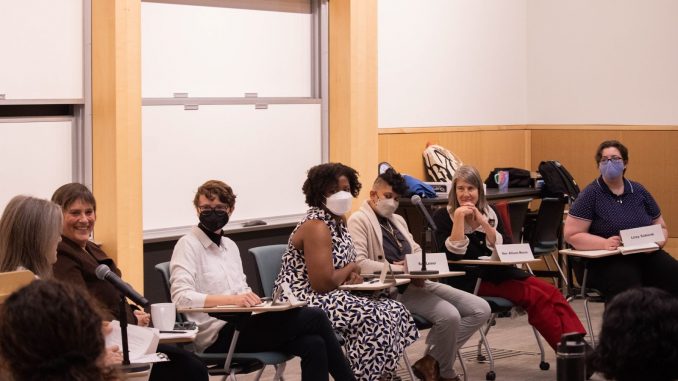
On Thursday, Nov. 10, SUNY New Paltz gathered several feminist activists and scholars together to hold the Feminism & Gender Oppressions: Ideas & Actions roundtable in the Science Hall. The roundtable kicks off the 2022-23 “Without Limits: Interdisciplinary Conversations in the Liberal Arts” program. The program is an annual event held by the College of Liberal Arts & Sciences that invites speakers to discuss different present day issues in our society. The theme for this year’s “Without Limits” series is Intersectional Activism Across Generations.
The roundtable featured English graduate student Erin Boss, English professor Dr. Crystal Donkor, activist Rae Leiner, Rev. Allison Moore, Ph.D., sociology professor Dr. Anne R. Roschelle and English graduate student Lizzy Sobiesk. Holland asked the panel questions about intersectionality, activism, learning from past scholars and creating effective change.
Attendees almost completely filled the lecture hall. The first hour and a half of the panel was a roundtable discussion, followed by an audience Q&A that went on until 7 p.m. A reception in the Science Hall lobby was held afterward.
Intersectionality was a focus of the conversation. Intersectionality, as defined by scholar and creator of the term Kimberlé Crenshaw, is a way to understand how different social identities interact to form distinct experiences of oppression. When discussing current events affecting women, like the overturning of Roe v. Wade, panelists highlighted the experiences of marginalized women.
“I do not think that it’s a coincidence that Roe v. Wade was overturned at the same time that there’s a massive attack on healthcare for trans youth on the state level,” Leiner said. “There are women who are impacted by the overturning of Roe v. Wade, and I also want to say that there are women being affected by not being able to access gender-affirming care.”
Panelists also talked about the importance of older and younger generations of feminists learning from each other. They agreed that the critique of past generations of activists and scholars for their lack of inclusivity is necessary in order to create a newer, intersectional feminist perspective.
“My world of feminist concepts and activism is quite different from my students thinking about it. I learned so much from those students,” Dr. Holland said, describing her own experiences learning from youth.
This idea extended into works from older political theorists. Feminist theory from earlier decades may be exclusionary or offensive to marginalized groups of women. The speakers noted that this is a difficult problem to approach, but that critique of this theory is important.
“Part of appreciating this historical perspective, but moving beyond it, involves acknowledging that the early feminists were also socially located. To be able to say, ‘Yes, these were the new and exciting ideas they brought,’ might invite the new and exciting ideas that we bring,” said Moore.
Near the end of the discussion, Dr. Holland asked the table about how feminists can create effective change in society. Literature, activism and community organization were all mentioned in terms of how they can change oppressive institutions.
“Whatever you use to help you think through strategy, that’s what you need to employ when you’re talking about trying to shift culture. We’re talking about institutions, we’re talking about government, we’re talking about policy,” Leiner said. “My liberation is bound up with everyone in this room.”
During the Q&A, an attendee asked the panelists if they get discouraged by the struggles women continue to face, and if so, how they deal with the discouragement. Each panelist noted that a sense of interdependence and community keeps them going and gives them hope.
“When I meet people or when I work with the people that I work with who are so committed and so dedicated and when I hear my students, it gives me energy and I can keep going,” Dr. Roschelle said.
For further reading on feminist theory, some books recommended on the panel include works from the Combahee River Collective, Rest is Resistance by Tricia Hersey and Emergent Strategy by Adrienne Maree Brown.
